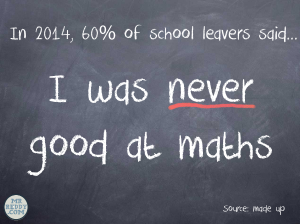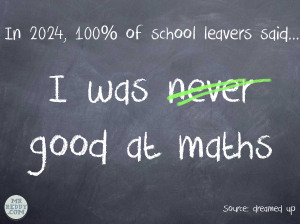“I was never any good at maths” – please help my desk study
 Spoiler alert: assistance required.
Spoiler alert: assistance required.
For as long as I’ve been a maths teacher, and probably before, it’s seemed to me a travesty that people would leave school saying they weren’t good at maths. Well I’ve decided to do something about it on a bigger scale. At the moment it’s early days but I’ve got a vision of a grass roots led anti-“anti-maths” idea up my sleeve. (Was that a two-negatives-make-a-positive moment?!)
One of the things we can tackle together is the spread of the “I was never any good” message that percolates through schools, homes and the media. There are many ways to go about this, for sure, but the lowest hanging fruit would be to educate parents and non-maths colleagues in primary and secondary schools about the harm they it does to children’s attitudes.
 In time, there may well be a website, posters, training material and maybe even a hashtag (leave your suggestions in the comments), to stem the back at but before I can get those things together, I need your help capturing the variety of different ways people express the “I was never any good” message. What phrases do they use? And how do you think the message is interpreted by pupils?
In time, there may well be a website, posters, training material and maybe even a hashtag (leave your suggestions in the comments), to stem the back at but before I can get those things together, I need your help capturing the variety of different ways people express the “I was never any good” message. What phrases do they use? And how do you think the message is interpreted by pupils?
At this point, it’s a little desk study requiring your input. Below are some questions that try to capture the precise words teachers/parents/media are using and the thoughts going through the pupils’ minds when they hear them. Armed with these phrases, I can then produce some “campaign material” that we can use in our schools.
Action: please complete the four questions in the form below.
Thank you to @Miniminstrels, @mrsmartinmaths, @LWmathsmatters, @Mr_spragg_maths, @danicquinn, @BermudaHSmaths and @c0mplexnumber who have already sent in their responses.
Remember – hashtag suggestions in the comments please 🙂
This is a long standing problem, deeply ingrained in our culture. As GH Hardy said in the 1940s in ‘A Mathematician’s Apology’, “most people are so frightened of the name of mathematics that they are ready, quite unaffectedly, to exaggerate their own mathematical stupidity”.
Part of the problem is in the way we deliver mathematics education – a two tier system, setting in schools, the focus on achieving a grade C, maths competitions that are only open to the best students. These things mean that the current generation will grow up with the same attitudes as the last. For example a student taking the foundation paper at GCSE will probably always believe, and tell people, that they are bad at maths. As teachers and parents we have a big job on our hands to fix this.
The most striking thing to me is that it’s socially acceptable to mock one’s own mathematical abilities but no-one would boast about being bad at spelling or grammar.
The issue often arises when people are asked to do mental arithmetic on the spot – they are embarrassed if they can’t do it instantly. I think it’s important for teachers to emphasise to students that there is no need to do mathematics quickly. ‘Beat the clock’ type exercises in maths lessons don’t help. We want students to grow up knowing that it’s ok to take their time to work out an answer, instead of giving up after a few seconds and claiming ‘I just can’t do maths’.
I’d envisage your campaign working a bit like the Plain English Campaign. You’d have a website and twitter account through which people can let you know when they hear or see an example of a public figure saying they’re bad at maths. Say, for example, an EastEnders character says they’re rubbish at maths, people would let you know, then you’d publish the details on your website and tweet/write to the BBC about it.
Once you get some national media coverage of your efforts (I can think of ways to make this happen), people in the public eye will start to take note and be careful what they say about maths. Your campaign will filter through to teachers and parents. Eventually you might even have annual ‘awards’ for those who champion maths and those who undermine it.
It will take a while to get the exposure you need but if we all start looking out for examples to start off with then I can see it working well.
When I first read your post I was dubious that it would be possible to change something so widespread. But the more I think about it, the more I realise that this cultural shift is achievable. I look forward to supporting your campaign.